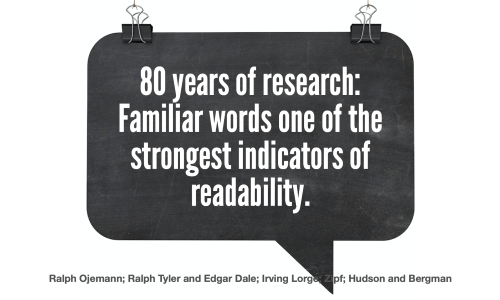Jargon makes your messages harder to read and understand
Richard Teerlink, chairman of Harley-Davidson, stands in front of a screen showing a bicep emblazoned with his company’s logo.

“We don’t call them tattoos any more,” he told his audience. Instead, he said, they are now “dermatological graphics.”
Of course you don’t, Mr. Teerlink.
Just like we don’t call it a company, talking, hiring consultants or coming up with ideas any more. Now they’re the enterprise, interfacing, utilizing change agents and ideation.
Jargon. Buzzwords. Acronyms. They’re things that make your reader go “huh?” And we need to get them out of our message.
Here are just a few ways jargon affects communication. Jargon:
1. Makes readers work harder.
When Jim Evans joined Jenny Craig as CEO, even he couldn’t understand the acronyms.

“There were too many for me to decipher, and only those who had been on board for at least a few years could understand them all,” he said.
When people can’t interpret the language of the organization:
- Employees misunderstand instructions
- Newbies have a longer learning curve
- Culturally and geographically diverse team members can’t comprehend what their colleagues are saying.
Your audience may eventually figure out what you’re saying. But isn’t it your job to translate jargon so your reader doesn’t have to?
2. Makes ideas harder to “see.”
We say “I see” to mean “I understand.” Help readers “see” your point by translating jargon into visual language.
We see a tattoo, for instance. We don’t see a “dermatalogical graphic.”
Poet William Carlos Williams counseled writers to “turn ideas into things.” Jargon turns things into a wall of words.
3. Causes buzzword backlash.
People are livid about the amount of jargon and buzzwords writers use these days.
- You’ve seen the Dilbert cartoons where the staff plays buzzword bingo against the pointy-haired boss.
- You’ve visited websites that poke fun of buzzword-packed press releases.
- You’ve heard journalists and bloggers rant against press releases that are so discombobulating that even beat reporters can’t follow them.
In this environment, it’s never been more important to translate the language of our organizations into the language of our readers.
___
Sources: “Abolish the acronyms!” Ragan Report, July 19, 2004
Annette Fuentes, “Mortgage jargon can spell disaster,” USA Today, July 18, 2007

Leave a Reply